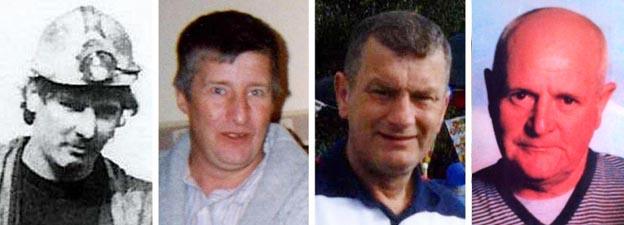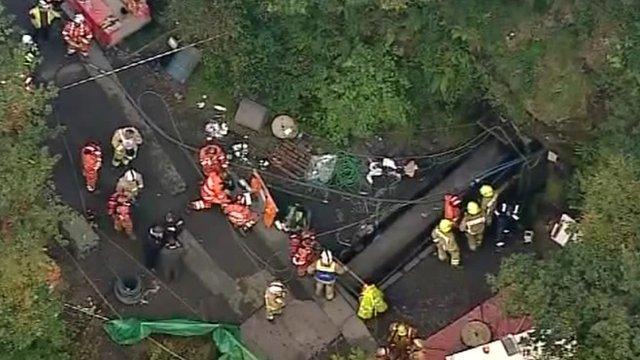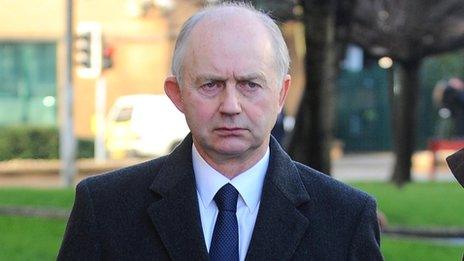Gleision mine deaths: Malcolm Fyfield's 'disregard' for safety
- Published

Garry Jenkins, 39, Philip Hill, 44, David Powell, 50, and Charles Breslin, 62, were killed in the mine
The manager of a coal mine where four men died disregarded workers' safety when he breached strict health and safety regulations, a court has heard.
Swansea Crown Court was told Malcolm Fyfield had been warned about the existence of underground water, which later flooded Gleison drift mine.
David Powell, 50, Charles Breslin, 62, Philip Hill, 44, and Garry Jenkins, 39, died in the incident in 2011.
Mr Fyfield and mine owners MNS deny manslaughter charges.
Up to 650,000 gallons of water swept through a closed-off section of the mine known as "the Old Central Workings" following the use of explosives, the jury heard.
Mr Fyfield was one of seven men working in the mine at the time and survived after he crawled out through sludge and dirt.
Prosecutor Gregg Taylor QC told the court Mr Fyfield should have known about the existence of the underground water and made a "catastrophic error of judgement" in miscalculating where he thought the water line was.
"Malcolm Fyfield [showed] a disregard for the safety of his workers. The risks he took can only be described as staggering," he said.
"Malcolm Fyfield intended to breach the Old Central Workings. He must have thought he could breach the workings without causing any danger to anyone.
"Malcolm Fyfield had been warned by many people about the existence of water in the old existing workings.
"Malcolm Fyfield decided to go his own way. It was his responsibility to follow the regulations and mine practices.
"Even if he did not believe there was any danger of an inrush it was still his duty to give his reasons to the mine's inspector."
'Catastrophic error'
Mr Taylor highlighted two sections of the Health and Safety Executive's code of practice, which states it is the "duty of the manager" to ensure "water or material that flows" does not rush into a mine.
The court heard that Malcolm Fyfield had been warned about the existence of underground water
Another section says workers should be at least 37 metres away from potentially hazardous areas, he said.
Mr Taylor also pointed to a hand-sketched map of the area the men were exploring before the incident on 15 September, 2011.
It showed an area being considered to extract coal from, with the word water written twice.
Mr Taylor claimed the drawing was done by Mr Fyfield and said he should have known where it was safe to dig for coal.
The jury was told Mr Fyfield had passed the required training needed for working in mines where underground water is present and had a "sound working knowledge" of the regulations.
Giving evidence, Simon Cooke, a deputy licensing manager for the Coal Authority, told the court Mr Fyfield was "meticulous" in submitting monthly and quarterly reports to the organisation.
He confirmed he had also given Mr Fyfield a reference for a job application.
The trial is due to last until at least the end of June.
- Published31 March 2014

- Published27 March 2014

- Published25 March 2014

- Published16 December 2013

- Published18 September 2013
